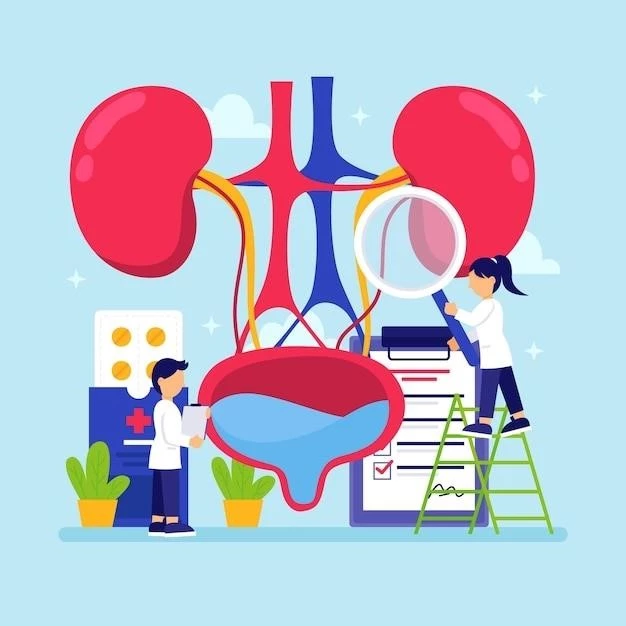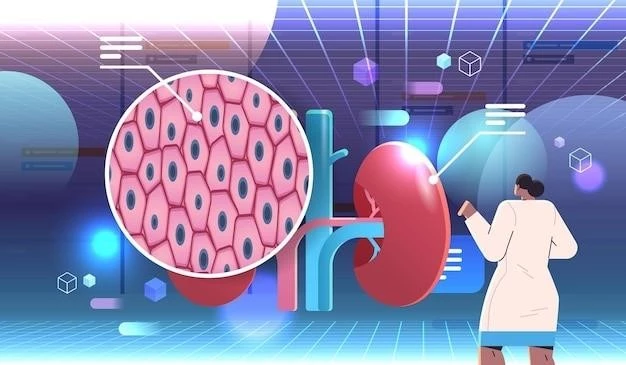Article Plan⁚ Disease ౼ Polycystic Kidney Disease, Type 1
Autosomal dominant polycystic kidney disease is a hereditary condition associated with bilateral kidney cysts. In Stage 1 Chronic Kidney Disease (CKD)٫ while kidneys function well٫ signs of damage may appear. Polycystic kidney disease involves cyst clusters primarily in kidneys. The PKD1 gene is located on chromosome 16٫ and PKD2 on chromosome 4. Patients with PKD2 tend to present symptoms later and have a lower renal failure risk.
Overview of Polycystic Kidney Disease
Autosomal dominant polycystic kidney disease (ADPKD) presents as an inherited condition characterized by the formation of fluid-filled cysts in the kidneys. These cysts may lead to kidney damage and impairment of renal function. The disease is often found in later stages, with clusters of cysts primarily affecting the kidneys. Understanding the genetic basis, such as the PKD1 and PKD2 genes, is crucial in diagnosing and managing the condition.
Individuals with ADPKD may experience a range of symptoms, from mild kidney impairment to more severe complications. Early detection through screening and genetic testing is vital in managing the disease effectively. Treatment strategies focus on slowing the progression of kidney damage, alleviating symptoms, and addressing associated complications. Lifestyle modifications and support resources play a significant role in enhancing the quality of life for individuals and families affected by this genetic disorder.

Genetic Basis of Polycystic Kidney Disease Type 1
Autosomal dominant polycystic kidney disease (ADPKD) is primarily caused by mutations in the PKD1 gene located on chromosome 16 and the PKD2 gene on chromosome 4. These genes encode proteins known as polycystin-1 and polycystin-2٫ which play essential roles in kidney function. Understanding the genetic basis of ADPKD is crucial in diagnosing and managing the disease effectively. Differentiating between PKD1 and PKD2 mutations can provide insights into the clinical presentation٫ prognosis٫ and treatment strategies for individuals with polycystic kidney disease type 1. Genetic testing and counseling can guide individuals and families in understanding their risk and implementing preventive measures.
Clinical Features of Polycystic Kidney Disease Type 1
Polycystic kidney disease type 1, an inherited condition, manifests as bilateral kidney cysts that can lead to kidney damage and impaired function. Symptoms range from mild kidney impairment to severe complications, potentially including renal failure. Mitral valve prolapse and mitral regurgitation are common. Differentiating between PKD1 and PKD2 mutations can influence the age of symptom onset, disease progression, and complications. Early detection through genetic testing is essential, allowing for proactive management and personalized treatment strategies. It’s crucial to monitor kidney function regularly, as individuals with PKD1 may have an increased risk of progressing to renal failure.
Diagnosis and Screening for Polycystic Kidney Disease Type 1
Diagnosing polycystic kidney disease type 1 involves genetic testing to identify mutations in the PKD1 gene on chromosome 16 or the PKD2 gene on chromosome 4. Imaging studies٫ such as ultrasound٫ CT scans٫ or MRI٫ can help detect cysts in the kidneys. Screening for PKD1 or PKD2 mutations in at-risk individuals allows for early intervention and personalized management plans. Regular monitoring of kidney function through blood tests٫ urine tests٫ and imaging studies is essential to track disease progression and assess the impact on renal function. Consult a healthcare provider for genetic counseling and personalized screening recommendations.
Management Strategies for Polycystic Kidney Disease Type 1
Managing polycystic kidney disease type 1 involves a holistic approach focusing on slowing disease progression, preserving kidney function, and addressing associated complications. Treatment may include blood pressure control, pain management, and lifestyle modifications to support overall kidney health. Regular monitoring of kidney function through imaging studies and blood tests is crucial to track disease progression and adjust management strategies accordingly. Consult with healthcare providers specialized in kidney care for personalized treatment plans tailored to your individual needs.
Complications Associated with Polycystic Kidney Disease Type 1
Complications of polycystic kidney disease type 1 can include renal impairment, hypertension, kidney stones, urinary tract infections, and an increased risk of intracranial aneurysms. Additionally, individuals with PKD1 may be prone to liver cysts, heart valve abnormalities, and digestive issues. Regular monitoring and early intervention are essential to prevent or manage these complications effectively. Consult with healthcare providers specialized in kidney and genetic disorders to address complications promptly and ensure optimal care.
Research and Treatment Advances in Polycystic Kidney Disease Type 1
Ongoing research in polycystic kidney disease type 1 focuses on identifying novel treatment approaches to slow disease progression, improve quality of life, and reduce complications. Cutting-edge therapies may target the underlying genetic mutations, such as PKD1 or PKD2, aiming to address the root cause of the condition. Advancements in diagnostic imaging techniques and biomarkers enable early detection of cyst formation, guiding personalized treatment plans. Stay informed about the latest research developments and consult with healthcare providers specialized in genetic kidney disorders for the most up-to-date treatment options available.
Lifestyle Recommendations for Individuals with Polycystic Kidney Disease Type 1
Living with polycystic kidney disease type 1 entails adopting a healthy lifestyle to support overall kidney function. Ensure to maintain a balanced diet low in sodium and protein to ease the burden on your kidneys. Regular exercise is beneficial for managing blood pressure and maintaining a healthy weight. Stay hydrated by drinking an adequate amount of water daily. Avoid smoking and limit alcohol consumption to protect kidney health. Additionally٫ manage stress levels through relaxation techniques and seek support from healthcare professionals and support groups to enhance your quality of life while managing polycystic kidney disease type 1.
Support Resources for Patients and Families Affected by Polycystic Kidney Disease Type 1
Living with polycystic kidney disease type 1 can be challenging, but you are not alone. Numerous support resources are available to help patients and their families navigate this genetic disorder. Seek out patient advocacy organizations, online forums, and support groups dedicated to polycystic kidney disease to connect with others facing similar challenges. Genetic counselors can provide valuable information about the condition and its inheritance patterns. Additionally, healthcare providers specializing in kidney diseases can offer guidance on managing symptoms and accessing appropriate care. Remember, support is crucial in coping with polycystic kidney disease type 1, so reach out and build a network of assistance around you.

